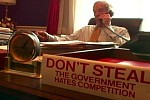 Shadows off the beaten path
Shadows off the beaten pathROMAN POLANSKI: WANTED AND DESIRED
< < D O C S > >
last update 7.Mar.09
See also: SHADOWS FILM FESTIVAL
 R E V I E W B Y R I C H C L I N E
R E V I E W B Y R I C H C L I N E
with Billy Connolly, Pat Boone, Janeane Garofalo, Hunter S Thompson, Judith Martin, Bill Maher, Kevin Smith, Tera Patrick, Ben Bradlee, Drew Carey, Alanis Morissette, Ice-T, Ron Jeremy, Sam Donaldson, Steven Bochco, Michael Medved
 release US 10.Nov.06,
release US 10.Nov.06, UK 13.Feb.09
05/US 1h33
 The documentary about the notorious expletive is packed with enough history and comedy to keep us entertained, even though it could have said the same things in 30 minutes. But some of the political material is extremely astute.
The documentary about the notorious expletive is packed with enough history and comedy to keep us entertained, even though it could have said the same things in 30 minutes. But some of the political material is extremely astute.
It's possibly the "most obscene word in America". On one side are comics who understand the word's power for shock, comedy and political commentary; on the other are those who think the word shows a lack of manners, intelligence and taste. And further along the spectrum are those who think that the word is a sign of utter moral failure. But the real question is why this word has such a magical hold on people.
Is it because, as Morissette notes, not everyone dares to use it? Is it because of its versatility? "It's a grand word and it has all sorts of meanings," says Donaldson. Or is it the kind of word that's only acceptable in wartime? Such as when George W Bush famously proclaimed, "F**k Saddam!" The film asks these and other questions, probing attitudes and opinions, wondering why a word can be so offensive in a nation that prizes free speech. And why even the FCC can't make a consistent ruling on its use over the airwaves.
As it continues, director Anderson weaves in plenty of film and TV clips, plus interviews with a wide range of people that trace the history from its first recorded use in 1475 and its growth in popularity during the two World Wars to the first appearance in a major film (M*A*S*H in 1970) and the 629 times it features in this documentary. Although he also gets a bit distracted, drifting off-topic to examine sex, porn and decency.
But the basic questions linger: How can a word be technically obscene when it isn't actually prurient? Why is it always about protecting children when they learn the word earlier than their parents think? And the politics of language do deserve being explored like this. After all, whose morality should we use to define the law? As Thompson asks, "Is this moral war a sign of a new dark age for culture?" Then Carey reminds us that there's one word that's even worse.
2.Feb.09
 R E V I E W B Y R I C H C L I N E
R E V I E W B Y R I C H C L I N E MUST
MUST  SEE
SEE
scr Felipe Lacerda, José Padilha
with Rosa, Robertina, Lucia, Flavio, Luiz, Vitoria, Ronaldo, Samara, Dan, Zequinha, Flaviana
 release Br Sep.08
release Br Sep.0808/Brazil 1h50


 Filmmaker Padilha shifts gears with this doc, leaving bustling Brazilian cities behind for an austere and unsettling examination of hunger. It's a bold, difficult film that feels like a cry from the heart.
Filmmaker Padilha shifts gears with this doc, leaving bustling Brazilian cities behind for an austere and unsettling examination of hunger. It's a bold, difficult film that feels like a cry from the heart.
Shot in 16mm black and white, the handheld camera follows three families; one lives in a city, one in a small town and the other out in the countryside. All are struggling to feed their increasing number of children, often resorting to garapa, a mixture of sugar and water that provides energy without any health benefits. The children don't know they're malnourished, and just get on with being kids. But they're probably aware of how their mothers do all the work while their fathers get drunk and squander what little they have.
With no narration or music, and only a few on-screen captions at the beginning and end, this is an extremely pure documentary, taking us intimately into everyday lives. The result is far more effective than either statistics or the heart-tugging propaganda charities use to raise funds. These people are not seeking pity, but they need help. And Padilha carefully shows them trying every means available--local clinics, government funding schemes, food provision programmes.
Skilfully shot in long takes, the imagery feels like a Satyajit Ray Apu movie crossed with Italian neo-realism, focussing on pure humanity without preaching or appealing to emotions. Padilha constantly catches real life: couples bickering and playfully joking, children playing or whining about garapa-induced toothaches, men in the grip of crippling machismo. The squalor is often overpowering, and yet it's shown as a matter-of-fact part of life alongside the lack of running water, electricity, rain, jobs and contraception ("The problem is that men and women get together," one woman says. "And that's it!").
Yes, this is a dark and distressing film, but what keeps it from wallowing is the pureness of it all. These people are unaware that they're in a generational downward spiral. And as Padilha says, he and his crew couldn't help but offer them assistance after filming. In the end, the fact is that Western countries have recently spent 40 times more on weapons than it would cost to eradicate world hunger. In other words, we could stop it if we wanted to. Or as Padilha says, "Hunger is a political decision."
11.Feb.09 bff
 R E V I E W B Y R I C H C L I N E
R E V I E W B Y R I C H C L I N E
scr Patrick Creadon, Christine O'Malley, Addison Wiggin
with Alan Greenspan, Warren Buffett, David Walker, Paul O'Neill, Peter G Peterson, Paul Volcker, Robert Rubin, William Bonner, Diane Rehm, Scott Spradling, Kent Conrad, Judd Gregg

release US 22.Aug.08,
UK 14.Nov.08
08/US Roadside 1h25
SUNDANCE FILM FEST
 There's not much balance in this financial doom-and-gloom doc, especially since it was released very early in the current economic crisis. It's still a profoundly important film, although a bit of hope wouldn't have hurt.
There's not much balance in this financial doom-and-gloom doc, especially since it was released very early in the current economic crisis. It's still a profoundly important film, although a bit of hope wouldn't have hurt.
The film opens with a thesis, "The biggest threat to the USA is not terrorism but our own fiscal irresponsibility", then sets about to prove it. And the evidence is certainly compelling. The unpleasant truth is that America is teetering over the abyss of collapse due to unsustainable federal debt, a disastrous trade imbalance and an impending welfare crisis. And the vast majority of US citizens don't have a clue, mirroring their government by spending more money than they have. What's needed is serious leadership and major reforms of policies that allowed this mess to develop.
There's no doubt about filmmaker Creadon political leaning, as he lays much of the blame on right-wing policies that favoured big business profits over things like a balanced federal budget, which is only aggravated by an unrestricted Wall Street. He notes that no nation in history has survived this kind of financial meltdown, from ancient Rome to the British Empire, which was effectively finished off during the Suez Canal crisis when the USA played its advantage as a bond-owner. This is something China has the power do to America today. And it gets worse.
Fortunately Creadon uses humour to hammer home his harshest criticism: of the American public, burying its head in the sand and electing people for all the wrong reasons. He uses an hilarious Saturday Night Live sketch starring Steve Martin and Amy Poehler to raise the alien concept that perhaps it's better if you "Don't Buy Stuff You Cannot Afford", and he also inventively illustrates former treasury boss Buffet's Thriftville/Squanderville bedtime story.
Whizzy graphics and a fast pace also help keep us from utter hopelessness, but it's impossible to ignore the fact that the last eight years of spend loads, cut taxes, cook the books and spend some more have left the nation crippled and the world in a deep recession. The only hope is for the US government to rediscover the fiscal discipline of the Clinton years; he achieved the first balanced budget in a generation and left office with a surplus. Obama certainly has a massive job to do.
16.Dec.08
 R E V I E W B Y R I C H C L I N E
R E V I E W B Y R I C H C L I N E MUST
MUST  SEE
SEE
scr Joe Bini, PG Morgan, Marina Zenovich
with Roman Polanski, Samantha Gailey Geimer, Mia Farrow, Anthea Sylbert, Andrew Braunsberg, Douglas Dalton, Lawrence Silver, Claus Preute, Richard Brenneman, Philip Vannatter, Roger Gunson, Marilyn Beck
 release US 11.Jul.08
release US 11.Jul.0808/US HBO 1h39
SUNDANCE FILM FEST CANNES FILM FEST
 Assembled in a style that lyrically captures Roman Polanski's own filmmaking vibe, this sleek, cool documentary it tells Polanski's story, astutely getting under the surface to sort the truth from the rumours.
Assembled in a style that lyrically captures Roman Polanski's own filmmaking vibe, this sleek, cool documentary it tells Polanski's story, astutely getting under the surface to sort the truth from the rumours.
Using film clips, newsreel images and interviews, Zenovich centres on the court case that has defined Polanski's reputation since he fled from America in 1978. Within this, she goes back to examine his youth and early career--the horrific childhood (he survived the Holocaust, but his mother died in a gas chamber), his emergence as a rising-star filmmaker, his romance with Sharon Tate and her brutal death at the hands of the Manson Family, and finally his relationship with then-13-year-old Geimer and the convoluted, chaotic trial that ensued.
Through it all, Zenovich maintains a mature, assured style that conveys a sense of mystery and intrigue. The wide variety of images are beautifully assembled to tell the story in bracing detail while always remembering the emotional aspects, as well as the sensational way these things have been perceived. She also talks to literally everyone who has played a part in his life, so what emerges is a story we've never heard. She doesn't vindicate Polanski, but honestly examines the injustice around him.
And even though all footage of him comes from archives, he emerges as a fascinating movie character through interviews, film roles and behind-the-scenes clips that catch his cheeky humour, appetite for life and pervasive naivete about the real world. All of this is underscored by a haunting sense of the tragedies he has survived, not to mention the false stories about him that were circulated during his trial and afterwards. This attention to detail fills the movie with drama and suspense, with a twisty unpredictability because we think we know what happened.
Besides her sheer skill as a filmmaker, Zenovich has also managed to illuminate a much deeper truth about how the media manipulate stories, building a mythical quality that's accepted as truth but is far from it. Through this film, she still lets us make up our own minds about Polanski. But she also makes sure we are outraged that his case has never been properly resolved. And exactly whose fault that is.
24.Dec.08


See also: SHADOWS FILM FESTIVAL
© 2009 by Rich Cline, Shadows
on the Wall